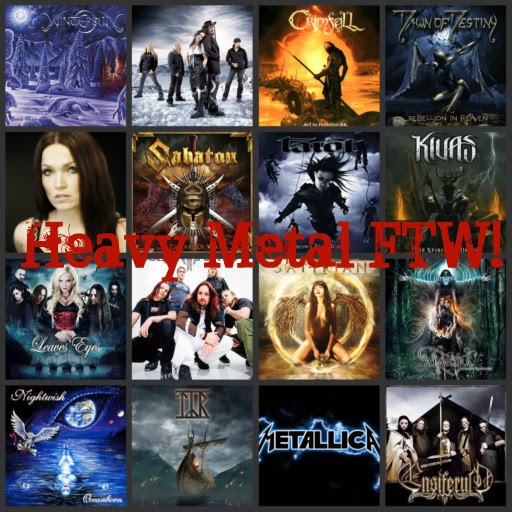 I'm as guilty of downloading as the next person; I don't do tons of it and I still buy a fair number of CDs as I am able to afford to, but yes, I download.
I'm as guilty of downloading as the next person; I don't do tons of it and I still buy a fair number of CDs as I am able to afford to, but yes, I download.My main reason for downloading is this: I don't have a lot of discretionary income and if I want to keep discovering & enjoying music & my favourite bands, I simply cannot afford to purchase every CD I want to. Especially because I like stuff that isn't always readily available in North America. I do what I can, though; I enjoy purchasing CDs and when I have the money in my budget to do so, I do buy CDs. In the case of really small bands I like to support, I make the extra effort and purchase the CD right from the band itself, as I did with Australian Gothic outfit Temujin and Canadian power metalers Borealis. I also like hearing a whole album before I commit to purchasing it; that's not always possible on MySpace or with every band.
I enjoy sitting down with a CD cover and listening to a CD as I read along with the lyrics, and I enjoy looking at album art, and I even enjoy reading the credits. However, I have priorities: I have a home, bills, debts, a cat, and many of the usual trappings of adulthood.
I believe artists deserve to be paid for what they produce and release, too. But if you take the example of the legal downloads available off of iTunes and sites like that where you pay a small fee, I seriously wonder how much of that small fee actually gets back to the artist. For instance, I bought Akoma's 3-track EP off of iTunes for $2.97CAD a few months ago. I am truly curious about how much of that $2.97 went to the band, though. Usually, iTunes sells single songs for 99¢; what percentage of that 99¢ goes to the artist? I don't know; I'm just asking. If it's the principle you're interested in, then that's one thing, but if iTunes is taking the majority of the cut, then that's not really helping anyone but iTunes, in my opinion.
What ticks me off sometimes is the attitude of some of the big acts out there who seem to think that downloading is the root of all evil. I was really irritated with Chester Bennington's recent comments about Linkin Park's latest CD sales numbers, found on Blabbermouth. The article says:
Well, I am one of those 10 million people that downloaded A Thousand Suns, and let me tell you, I feel no guilt about this whatsoever. That's because I thought the album sucked and I wouldn't have spent a penny on it anyway. What Chester is perhaps failing to realize here is that LPs most recent CD might not be the quality of their Meteora or Hybrid Theory days, which might also account for poor sales. I don't know; I'm just theorizing here.LINKIN PARK frontman Chester Bennington told MTV News last October that the
days of the band selling 10 million copies of an album, like its 2000 debut "Hybrid Theory", are long gone.
Bennington explained, "Trying to compare anything to 'Hybrid Theory' in terms of sales is an exercise in futility: It's not gonna happen. That's the reality of the situation. (Second album 'Meteora') did huge numbers the first week, it was like 800,000. 'Minutes To Midnight' was in the 600,000 mark, and this one's at the 240,000 mark; that's a sign of the times . . . people get their music in different ways now."
"Meteora" sold 810,000 copies in its first week of release, while 2007's "Minutes To
Midnight" moved 623,000.
Thanks to downloading and file sharing, Bennington said, "There's probably 10 million people out there who have the record that we don't know about."
Slipknot's Cory Taylor has a bit of a different view, according to this article. He says:
"Seriously, who the fuck wants to risk hard-earned money on music that's maybe 98 percent crap? I'm not going to. And I still buy new albums. People ask what my favorite new album is and nine times out of 10, I don't fucking have one. Music is garbage."
"People wanna blame the decline of album sales on downloading, I think it's actually the record companies' fault," he added. "I think it's the quality of the product. If record companies would stop giving any fucking mook on the street with a fringe a record deal or their own record label, maybe you would sell more fucking albums, dipshits."
